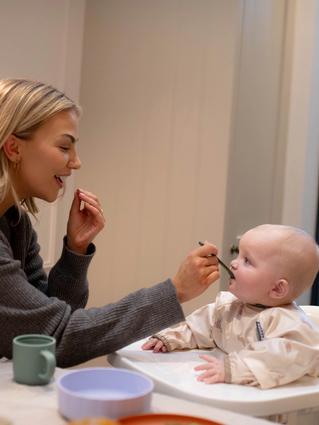
Babies of this age…
- Start to make different and repetitive noises such as “da da” (it's unfair, we know, but “dada” usually comes before “mama”!)
- May sit up well by themselves - but don’t forget the cushions in case they topple over!
- ‘Talk’ away to themselves and in response to you
- May lunge forward to reach for things, nearly getting into a crawling position
Your baby
- Talking to your baby, playing and singing together helps with brain and body development and communication skills
- Clapping and action rhymes help to develop co-ordination
- Standing or bouncing baby on your lap helps develop and strengthen muscles
- Quiet time to play and to look around will give your baby space to absorb and make sense of the world
Babies develop at their own pace
At around 7 months, it can feel like your baby is doing something new every day – sitting up, giggling, reaching for toys, exploring textures, or trying to 'eat' anything they can get their hands on! These little moments of progress are exciting to watch, and it’s lovely to record them when you can – even a quick note in your phone or a baby book can become a treasured memory later.
It’s completely normal to wonder if your baby is doing things “on time,” especially when chatting to other parents. But try not to compare too much – every baby develops at their own pace. Some will be crawling or pulling themselves up early, while others will take their time. One baby might be chatting away with babble, while another is quietly observing the world.
There’s a wide range of what’s considered typical, and most babies will catch up in their own time. So, rather than focusing on the milestone checklist, try to enjoy the stage your baby is in right now – it’s all part of their unique journey.
Feeding
This is the perfect time to start introducing foods with more texture. Learning to chew is important for babies’ development (and has an effect on speech development, too). Babies can chew quite well even if they have no teeth. However, it can be a little stressful for you at first, as your baby might spit out the lumps or even cough them back up to have another chew at them.
Enough iron?
At this age, you'll want to make sure you are giving your baby some foods that are rich in iron. This is important, because the stores of iron babies are born with run out when they are about 6 months old. To improve iron absorption, you can give a food or drink that's rich in vitamin C, such as fruit or diluted fruit juice, along with an iron-rich meal.
Follow-on milk is fortified with vitamins and minerals, so it's another good way to make sure your baby is getting enough iron.
Mums should think about whether they’re getting enough iron, too (most women under 50 aren’t). Did you know that drinking tea with meals reduces the absorption of any iron in that meal? So if you're trying to make the most of the iron you consume, it might be best to put off that morning cuppa until an hour or so after you've had your cereal.
3 meals a day?
If your baby is enjoying three meals a day, you can try dropping one milk feed and offering water or diluted fruit juice in a cup or beaker instead. There’s no need to boil tap water for babies over 6 months, unless you are using it to make up milk feeds.
